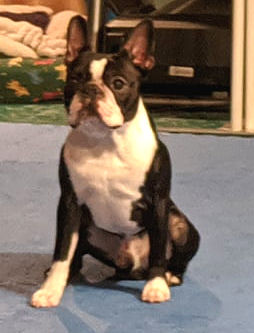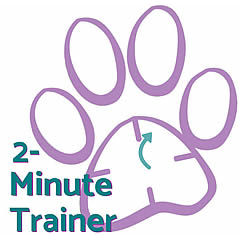No one seems to know exactly why, or how, dogs threw their lot in with humanity in ancient days. But they did, and dogs actually care what we think. That’s the point all 2-Minute Training pivots on. Dogs care what we think.
Behavior that gets attention gets repeated
Taking it a step further, behavior that gets attention gets repeated. Think about that for a minute. Things that you give focus on happen again.
That’s why it’s crucial to “pay” your dog for the good stuff. And ignore the naughty. If a dog is constantly jumping on people and those people yell, kick, brush away the dog – that’s all attention being given to that naughty behavior.

Some would argue that because the attention is negative, it’s giving the proper message. But dogs don’t care. They don’t understand the difference between good and bad attention. They only understand that a person they love focuses on them. It’s all good to dogs. That’s why, sadly, most abused dogs never turn on their owners. Any attention from their person is cherished.
Counter-conditioning yourself
It’s absolutely normal to concentrate on the things that are “wrong.” It goes against every instinct to ignore bad behavior. Standing still and staring at the ceiling when a dog is jumping on you is hard. But it’s the best way to convey information to the dog.
We have to realize that dog training is, in essence, trying to communicate with aliens. They don’t speak our language, they don’t see the world the way we do, and they don’t think like we do.
Our best advantage is that dogs do love us, and dogs care what we think. They’re happiest when we’re happy. That’s a blessing we’re thankful for every day. And it means we have to work really hard at remembering to reward the stuff we like.
Pay your dog
Dogs learn through the timing and placement of rewards. “That was good!” is the message every treat morsel conveys to your dog. A scratch behind the ear and a hearty “Good Dog!” is almost as good. How many times have you said “Are you a good dog?” just to get your dog’s tail to wag? They love playing that game!
And every time you smile, laugh, or sound delighted, you’re paying your dog with praise. It’s hard for many people to open up in public places and give their dogs the feedback they thrive on. What we tell our dog training students and clients is: No one’s looking at you. (We talked about this in our article, “Dogs Don’t Judge.”) Anyone who’s watching is looking at your dog. Dogs are eye magnets. Just go ahead and keep playing your training games. If somebody’s watching, maybe they’ll learn something by seeing what a good time you’re both having.
What gets attention gets repeated
Dogs are smart. And dogs care what we think. The things we pay attention to are the things dogs will try again and again. If your focus has been on the negative: barking, jumping, humping, counter-surfing; those are the things your dog thinks are important. He/she has no way of knowing that sitting, cuddling, retrieving, lying down, are better choices.
It takes time to change your awareness to the positive. It’s natural for people to ignore things that are unremarkable. If your dog is calmly watching the world go by at the front window, that deserves payment. That’s exactly the behavior you want. But because it’s “normal” you might forget to reward it.
Take note of the good things your dog does every single day. Let him/her know that you appreciate them being good. That they’re doing something you’d like to see again.






